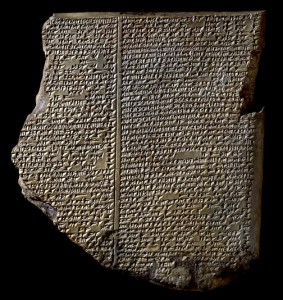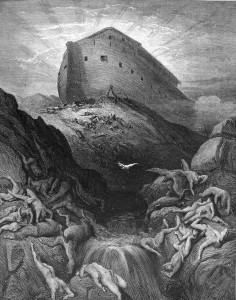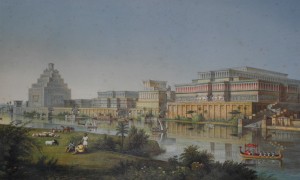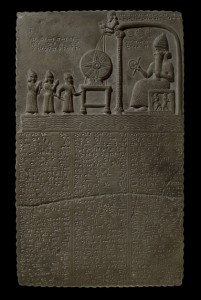As the Babylonian and Hebrew flood narratives play such a central role in The 13thTablet, this short introduction may come in handy to the avid reader! In 1872, George Smith made an amazing discovery among the clay tablets of the British Museum originally from Nineveh and other sites in Iraq. It was the eleventh tablet from a series of twelve composing the Standard Akkadian version of the Epic of Gilgamesh. It described the primordial flood with such similarities to the biblical version of the flood that he immediately saw the potential of such a parallel. Indeed, both Noah and his Babylonian counterpart Utnapishtim are warned about the imminent flood and told to build an ark with specific dimensions; a horrific flood destroys all living things; the boat rests on a mountain top; a dove and a raven are sent forth from the ark and when the bird does not return, both characters leave the ark to offer a sacrifice to the divinity.
The fact that there should be two similar versions of the flood should not come too much as a surprise. Indeed, the legend of a catastrophic flood that destroyed all of mankind except a few who escape in a boat is one of the most widespread myths throughout the world (India, China, Hawaii, Mexican-Indians, aborigines of the Andaman Islands, ancient Greece, New Zealand, Africa, Greenland, Finland, etc. all have a similar version of the primordial flood) but the legend is never told in such a similar fashion.
Based on the material evidence (and notwithstanding some differences between the texts and some debatable discrepancies within the Hebrew text), it would seem that the biblical narrative came second to the Babylonian one. Indeed, if Moses was the author of the Hebrew Bible then the biblical Flood narrative dates to circa 1440 B.C.E. But the story of Utnapishtim, even though it is known from the Epic of Gilgamesh which dates back to the 7th century B.C.E. (from an original edition by the incantation priest Sîn-lēqi-unninni sometime between 1300–1100 B.C.E.), it is actually found in earlier Epics, such the Epic of Atrahasis (circa 1750-1650 B.C.E. also found by George Smith, in Nineveh, May 14, 1873) and from even earlier Sumerian poems in Old Babylonian (circa 2000 B.C.E.). Yet, the Mosaic account may also be an accurate written form of an ancient oral tradition of the original catastrophic event that gave rise to the Mesopotamian, Hebrew, and many other written texts. It is also possible that the Noah story reinterpreted the Babylonian story with a different theological twist (e.g. “humans had turned evil and needed to be cleansed” in the biblical version in contrast to “humans made noise, and bothered the gods” in the other). Ultimately, according to the bible itself the ancestors of the Jews originally came from Mesopotamia (Abraham of Ur), so both interpretations are possible.
FURTHER READING
D. Hammerly-Dupuy, “Some observations on the Assyro-Babylonian and Sumerian Flood Stories”, Andrews University Seminary Studies 6 (1968) 1-18.
T. Frymer-Kensky, “What the Babylonian Flood Stories Can and Cannot Teach Us About the Genesis Flood”, Biblical Archaeology Review Nov/Dec 1978
A. George, Babylonian Gilgamesh Epic: Introduction, Critical Edition and Cuneiform Texts, 2 vols., Oxford University Press, 2001.
D. Damrosch, The Buried Book: The Loss and Rediscovery of the Great Epic of Gilgamesh, 2007.
GENESIS 6-9 (translation from the King James Bible: full version)
And it came to pass, when men began to multiply on the face of the earth, and daughters were born unto them that the sons of God saw the daughters of men that they were fair; and they took them wives of all which they chose. And the LORD said, My spirit shall not always strive with man, for that he also is flesh: yet his days shall be an hundred and twenty years. There were giants in the earth in those days; and also after that, when the sons of God came in unto the daughters of men, and they bare children to them, the same became mighty men which were of old, men of renown.
And God saw that the wickedness of man was great in the earth, and that every imagination of the thoughts of his heart was only evil continually. And it repented the LORD that he had made man on the earth, and it grieved him at his heart. And the LORD said, I will destroy man whom I have created from the face of the earth; both man, and beast, and the creeping thing, and the fowls of the air; for it repenteth me that I have made them.
But Noah found grace in the eyes of the LORD. These are the generations of Noah: Noah was a just man and perfect in his generations, and Noah walked with God. And Noah begat three sons, Shem, Ham, and Japheth. The earth also was corrupt before God, and the earth was filled with violence. And God looked upon the earth, and, behold, it was corrupt; for all flesh had corrupted his way upon the earth. And God said unto Noah, The end of all flesh is come before me; for the earth is filled with violence through them; and, behold, I will destroy them with the earth.
Make thee an ark of gopher wood; rooms shalt thou make in the ark, and shalt pitch it within and without with pitch. And this is the fashion which thou shalt make it of: The length of the ark shall be three hundred cubits, the breadth of it fifty cubits, and the height of it thirty cubits. A window shalt thou make to the ark, and in a cubit shalt thou finish it above; and the door of the ark shalt thou set in the side thereof; with lower, second, and third stories shalt thou make it. And, behold, I, even I, do bring a flood of waters upon the earth, to destroy all flesh, wherein is the breath of life, from under heaven; and every thing that is in the earth shall die. But with thee will I establish my covenant; and thou shalt come into the ark, thou, and thy sons, and thy wife, and thy sons’ wives with thee.
And of every living thing of all flesh, two of every sort shalt thou bring into the ark, to keep them alive with thee; they shall be male and female. Of fowls after their kind, and of cattle after their kind, of every creeping thing of the earth after his kind, two of every sort shall come unto thee, to keep them alive. And take thou unto thee of all food that is eaten, and thou shalt gather it to thee; and it shall be for food for thee, and for them. Thus did Noah; according to all that God commanded him, so did he.
And the LORD said unto Noah, Come thou and all thy house into the ark; for thee have I seen righteous before me in this generation. Of every clean beast thou shalt take to thee by sevens, the male and his female: and of beasts that are not clean by two, the male and his female. Of fowls also of the air by sevens, the male and the female; to keep seed alive upon the face of all the earth. For yet seven days, and I will cause it to rain upon the earth forty days and forty nights; and every living substance that I have made will I destroy from off the face of the earth. And Noah did according unto all that the LORD commanded him.
And Noah was six hundred years old when the flood of waters was upon the earth. And Noah went in, and his sons, and his wife, and his sons’ wives with him, into the ark, because of the waters of the flood. Of clean beasts, and of beasts that are not clean, and of fowls, and of every thing that creepeth upon the earth there went in two and two unto Noah into the ark, the male and the female, as God had commanded Noah. And it came to pass after seven days, that the waters of the flood were upon the earth. In the six hundredth year of Noah’s life, in the second month, the seventeenth day of the month, the same day were all the fountains of the great deep broken up, and the windows of heaven were opened. And the rain was upon the earth forty days and forty nights. In the selfsame day entered Noah, and Shem, and Ham, and Japheth, the sons of Noah, and Noah’s wife, and the three wives of his sons with them, into the ark; they, and every beast after his kind, and all the cattle after their kind, and every creeping thing that creepeth upon the earth after his kind, and every fowl after his kind, every bird of every sort. And they went in unto Noah into the ark, two and two of all flesh, wherein is the breath of life. And they that went in, went in male and female of all flesh, as God had commanded him: and the LORD shut him in.
And the flood was forty days upon the earth; and the waters increased, and bare up the ark, and it was lift up above the earth. And the waters prevailed, and were increased greatly upon the earth; and the ark went upon the face of the waters. And the waters prevailed exceedingly upon the earth; and all the high hills, that were under the whole heaven, were covered. Fifteen cubits upward did the waters prevail; and the mountains were covered. And all flesh died that moved upon the earth, both of fowl, and of cattle, and of beast, and of every creeping thing that creepeth upon the earth, and every man: All in whose nostrils was the breath of life, of all that was in the dry land, died. And every living substance was destroyed which was upon the face of the ground, both man, and cattle, and the creeping things, and the fowl of the heaven; and they were destroyed from the earth: and Noah only remained alive, and they that were with him in the ark. And the waters prevailed upon the earth an hundred and fifty days.
And God remembered Noah, and every living thing, and all the cattle that was with him in the ark: and God made a wind to pass over the earth, and the waters asswaged. The fountains also of the deep and the windows of heaven were stopped, and the rain from heaven was restrained; and the waters returned from off the earth continually: and after the end of the hundred and fifty days the waters were abated. And the ark rested in the seventh month, on the seventeenth day of the month, upon the mountains of Ararat. And the waters decreased continually until the tenth month: in the tenth month, on the first day of the month, were the tops of the mountains seen. And it came to pass at the end of forty days, that Noah opened the window of the ark which he had made: and he sent forth a raven, which went forth to and fro, until the waters were dried up from off the earth. Also he sent forth a dove from him, to see if the waters were abated from off the face of the ground. But the dove found no rest for the sole of her foot, and she returned unto him into the ark, for the waters were on the face of the whole earth: then he put forth his hand, and took her, and pulled her in unto him into the ark. And he stayed yet other seven days; and again he sent forth the dove out of the ark; and the dove came in to him in the evening; and, lo, in her mouth was an olive leaf plucked off: so Noah knew that the waters were abated from off the earth. And he stayed yet other seven days; and sent forth the dove; which returned not again unto him any more.
And it came to pass in the six hundredth and first year, in the first month, the first day of the month, the waters were dried up from off the earth: and Noah removed the covering of the ark, and looked, and, behold, the face of the ground was dry. And in the second month, on the seven and twentieth day of the month, was the earth dried. And God spake unto Noah, saying, Go forth of the ark, thou, and thy wife, and thy sons, and thy sons’ wives with thee. Bring forth with thee every living thing that is with thee, of all flesh, both of fowl, and of cattle, and of every creeping thing that creepeth upon the earth; that they may breed abundantly in the earth, and be fruitful, and multiply upon the earth. And Noah went forth, and his sons, and his wife, and his sons’ wives with him. Every beast, every creeping thing, and every fowl, and whatsoever creepeth upon the earth, after their kinds, went forth out of the ark. And Noah built an altar unto the LORD; and took of every clean beast, and of every clean fowl, and offered burnt offerings on the altar. And the LORD smelled a sweet savour; and the LORD said in his heart, I will not again curse the ground any more for man’s sake; for the imagination of man’s heart is evil from his youth; neither will I again smite any more every thing living, as I have done. While the earth remaineth, seedtime and harvest, and cold and heat, and summer and winter, and day and night shall not cease.
And God blessed Noah and his sons, and said unto them, Be fruitful, and multiply, and replenish the earth. And the fear of you and the dread of you shall be upon every beast of the earth, and upon every fowl of the air, upon all that moveth upon the earth, and upon all the fishes of the sea; into your hand are they delivered. Every moving thing that liveth shall be meat for you; even as the green herb have I given you all things. But flesh with the life thereof, which is the blood thereof, shall ye not eat. And surely your blood of your lives will I require; at the hand of every beast will I require it, and at the hand of man; at the hand of every man’s brother will I require the life of man. Whoso sheddeth man’s blood, by man shall his blood be shed: for in the image of God made he man. And you, be ye fruitful, and multiply; bring forth abundantly in the earth, and multiply therein. And God spake unto Noah, and to his sons with him, saying, And I, behold, I establish my covenant with you, and with your seed after you. And with every living creature that is with you, of the fowl, of the cattle, and of every beast of the earth with you; from all that go out of the ark, to every beast of the earth.
And I will establish my covenant with you, neither shall all flesh be cut off any more by the waters of a flood; neither shall there any more be a flood to destroy the earth. And God said, This is the token of the covenant which I make between me and you and every living creature that is with you, for perpetual generations: I do set my bow in the cloud, and it shall be for a token of a covenant between me and the earth. And it shall come to pass, when I bring a cloud over the earth, that the bow shall be seen in the cloud: And I will remember my covenant, which is between me and you and every living creature of all flesh; and the waters shall no more become a flood to destroy all flesh. And the bow shall be in the cloud; and I will look upon it, that I may remember the everlasting covenant between God and every living creature of all flesh that is upon the earth. And God said unto Noah, This is the token of the covenant, which I have established between me and all flesh that is upon the earth.
THE BABYLONIAN FLOOD NARRATIVE (translation by E. A. Wallis Budge: click here)
The account of the Deluge given below is found on the Eleventh of the Series of Twelve Tablets in the Library of King Ashubanipal (668-626 B.C.E.) at Nineveh. The Legend of the Deluge has in reality no connection with the Epic of Gilgamesh, but was introduced into it by the editors of the Epic. Gilgamesh meditated deeply how he could escape death. He sought his ancestor Utnapishtim who had found the secret to immortality. In their discussion His ancestor tells him about the Deluge.
Gilgamesh said unto Utnapishtim, to Utnapishtim the remote: “I am looking at thee, Utnapishtim. Thy person is not altered; even as am I so art thou. Verily, nothing about thee is changed; even as am I so art thou. [Moved is my] heart to do battle, But thou art at leisure and dost lie upon thy back. How then wast thou able to enter the company of the gods and see life?”
[Thereupon Utnapishtim related to Gilgamesh the Story of the Deluge, and the Eleventh Tablet continues thus]
Utnapishtim said unto him, to Gilgamesh: “I will reveal unto thee, O Gilgamesh, a hidden mystery. And a secret matter of the gods I will declare unto thee. Shurippak, a city which thou thyself knowest. On [the bank] of the river Puratti (Euphrates) is situated. That city was old and the gods [dwelling] within it. Their hearts induced the great gods to make a wind-storm (a-bu-bi). Their father Anu. Their counsellor, the warrior Enlil. Their messenger En-urta [and] Their prince Ennugi. Nin-igi-azag, Ea, was with them [in council] and reported their word to the house of reeds.
[First Speech of Ea to Utnapishtim who is sleeping in a reed hut.]
O House of reeds, O House of reeds! O Wall, O Wall! O House of reeds, hear! O Wall, understand! O man of Shurippak, son of Ubara-Tutu. Throw down the house, build a ship. Forsake wealth, seek after life. Abandon possessions, save thy life. Carry grain of every kind into the ship. The ship which thou shalt build. The dimensions thereof shall be measured. The breadth and the length thereof shall be the same… the ocean, provide it with a roof.”
[Utnapishtim’s answer to Ea.]
“I understood and I said unto Ea, my lord. [I comprehend] my lord, that which thou hast ordered. I will regard it with great reverence, and will perform it. But what shall I say to the town, to the multitude, and to the elders?”
[Second Speech of Ea.]
“Ea opened his mouth and spake. And said unto his servant, myself. … Thus shalt thou say unto them: Ill-will hath the god Enlil formed against me. Therefore I can no longer dwell in your city. And never more will I turn my countenance upon the soil of Enlil. I will descend into the ocean to dwell with my lord Ea. But upon you he will rain riches. A catch of birds, a catch of fish. … an [abundant] harvest. … the prince (?) of the darkness. … shall make a violent cyclone [to fall upon you].”
[The Building of the Ship.]
As soon as [the dawn] broke…
[Lines 49-54 broken away.]
The weak [man] … brought bitumen. The strong [man] … brought what was needed. On the fifth day I decided upon its plan. According to the plan its walls were 10 Gar (i.e. 120 cubits) high. And the circuit of the roof thereof was equally 10 Gar. I measured out the hull thereof and marked it out (?). I covered (?) it six times. Its exterior I divided into seven. Its interior I divided into nine. Water bolts I drove into the middle of it. I provided a steering pole, and fixed what was needful for it. Six sar of bitumen I poured over the inside wall. Three sar of pitch I poured into the inside. The men who bear loads brought three sar of oil. Besides a sar of oil which the offering consumed. And two sar of oil which the boatman hid. I slaughtered oxen for the [work]people. I slew sheep every day. Beer, sesame wine, oil and wine. I made the people drink as if they were water from the river. I celebrated a feast-day as if it had been New Year’s Day. I opened [a box of ointment], I laid my hands in unguent. Before the sunset the ship was finished. [Since] … was difficult. The shipbuilders brought the … of the ship, above and below. … two-thirds of it.
[The Loading of the Ship.]
With everything that I possessed I loaded it (i.e. the ship). With everything that I possessed of silver I loaded it. With everything that I possessed of gold I loaded it. With all that I possessed of living grain I loaded it. I made to go up into the ship all my family and kinsfolk. The cattle of the field, the beasts of the field, all handicraftsmen I made them go up into it.
The god Shamash had appointed me a time (saying). The Power of Darkness will at eventide make a rain-flood to fall. Then enter into the ship and shut thy door. The appointed time drew nigh. The Power of Darkness made a rain-flood to fall at eventide. I watched the coming of the [approaching] storm. “When I saw it terror possessed me. I went into the ship and shut my door. To the pilot of the ship, Puzur-Bêl (or Puzur-Amurri) the sailor. I committed the great house (i.e. ship), together with the contents thereof.
[The Abubu (Cyclone) and its effects Described.]
As soon as the gleam of dawn shone in the sky. A black cloud from the foundation of heaven came up. Inside it the god Adad (Rammânu) thundered. The gods Nabû and Sharru (i.e. Marduk) went before. Marching as messengers over high land and plain. Irragal (Nergal) tore out the post of the ship. En-urta (Ninib) went on, he made the storm to descend. The Anunnaki brandished their torches. With their glare they lighted up the land. The whirlwind (or, cyclone) of Adad swept up to heaven. Every gleam of light was turned into darkness. …… the land …… as if …… had laid it waste. A whole day long [the flood descended] . Swiftly it mounted up ….. [the water] reached to the mountains. [The water] attacked the people like a battle. Brother saw not brother. Men could not be known (or, recognized) in heaven. The gods were terrified at the cyclone. They betook themselves to flight and went up into the heaven of Anu. The gods crouched like a dog and cowered by the wall. The goddess Ishtar cried out like a woman in travail. The Lady of the Gods lamented with a loud voice [saying]:
[Ishtar’s Lament.]
“Verily the former dispensation is turned into mud. Because I commanded evil among the company of the gods. When I commanded evil among the company of the gods. I commanded battle for the destruction of my people. Did I of myself bring forth my people. That they might fill the sea like little fishes?”
[Utnapishtim’s Story continued.]
The gods of the Anunnaki wailed with her. The gods bowed themselves, and sat down, and wept. Their lips were shut tight (in distress) … For six days and nights. The storm raged, and the cyclone overwhelmed the land.
[The Abating of the Storm.]
When the seventh day approached the cyclone and the raging flood ceased. —now it had fought like an army. The sea became quiet and went down, and the cyclone and the rain-storm ceased. I looked over the sea and a calm had come. And all mankind were turned into mud. The land had been laid flat like a terrace. I opened the air-hole and the light fell upon my face. I bowed myself, I sat down, I cried. My tears poured down over my cheeks. I looked over the quarters of the world—open sea! After twelve days an island appeared. The ship took its course to the land of Nisir. The mountain of Nisir held the ship, it let it not move. The first day, the second day, the mountain of Nisir held the ship and let it not move. The third day, the fourth day, the mountain of Nisir held the ship and let it not move. The fifth day, the sixth day, the mountain of Nisir held the ship and let it not move. When the seventh day had come. I brought out a dove and let her go free. The dove flew away and [then] came back; Because she had no place to alight on she came back. I brought out a swallow and let her go free. The swallow flew away and [then] came back. Because she had no place to alight on she came back. I brought out a raven and let her go free. The raven flew away, she saw the sinking waters. She ate, she pecked in the ground, she croaked, she came not back.
[Utnapishtim Leaves the Ship.]
Then I brought out everything to the four winds and offered up a sacrifice. I poured out a libation on the peak of the mountain. Seven by seven I set out the vessels. Under them I piled reeds, cedarwood and myrtle (?). The gods smelt the savour, The gods smelt the sweet savour. The gods gathered together like flies over him that sacrificed.
[Speech of Ishtar, Lady of the Gods.]
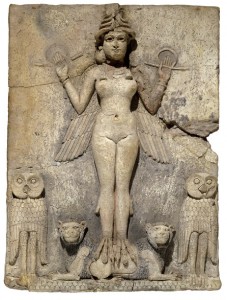
Ishtar, The ‘Queen of the Night’ relief, from Iraq, 1800-1750 BCE | © Trustees of the British Museum
Now when the Lady of the Gods came nigh, She lifted up the priceless jewels which Anu had made according to her desire, [saying] “O ye gods here present, as I shall never forget the lapis-lazuli jewels of my neck. So shall I ever think about these days, and shall forget them nevermore! Let the gods come to the offering. But let not Enlil come to the offering. Because he would not accept counsel and made the cyclone. And delivered my people over to destruction.”
[The Anger of Enlil (Bêl).]
Now when Enlil came nigh. He saw the ship; then was Enlil wroth. And he was filled with anger against the gods, the Igigi [saying]:
“What kind of a being hath escaped with his life? He shall not remain alive, a man among the destruction!”
[Speech of En-Urta.]
Then En-Urta opened his mouth and spake. And said unto the warrior Enlil (Bêl): Who besides the god Ea can make a plan? The god Ea knoweth everything. He opened his mouth and spake. And said unto the warrior Enlil (Bêl). O Prince among the gods, thou warrior. How couldst thou, not accepting counsel, make a cyclone? He who is sinful, on him lay his sin. He who transgresseth, on him lay his transgression. But be merciful that [everything] be not destroyed; be long-suffering that [man be not blotted out]. Instead of thy making a cyclone, Would that a lion had come and diminished mankind. Instead of thy making a cyclone. Would that a wolf had come and diminished mankind. Instead of thy making a cyclone. Would that a famine had arisen and [laid waste] the land. Instead of thy making a cyclone. Would that Urra (the Plague god) had risen up and [laid waste] the land. As for me I have not revealed the secret of the great gods. I made Atra-hasis to see a vision, and thus he heard the secret of the gods. Now therefore counsel him with counsel.”
[Ea deifies Utnapishtim and his Wife.]
“Then the god Ea went up into the ship. He seized me by the hand and brought me forth. He brought forth my wife and made her to kneel by my side. He turned our faces towards each other, he stood between us, he blessed us [saying]. Formerly Utnapishtim was a man merely. But now let Uta-Napishtiin and his wife be like unto the gods, ourselves. Utnapishtim shall dwell afar off, at the mouth of the rivers.”
[Utnapishtim Ends his Story of the Deluge.]
“And they took me away to a place afar off, and made me to dwell at the mouth of the rivers.”
See also Wikipedia – Gilgamesh in popular culture | Epic of Gilgamesh | Gilgamesh flood myth.

